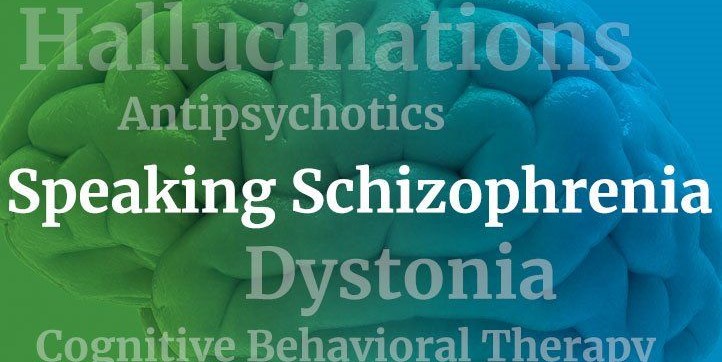Schizophrenia Glossary

When you or someone you know is diagnosed with schizophrenia or schizoaffective disorder, you’ll encounter many new terms and phrases. This glossary will walk you through condition-related and medical jargon so you can understand what’s happening and how to get the most effective treatment for schizophrenia.
Antidepressants These are medicines used to treat depression. Some people with schizophrenia also experience depression.
Antipsychotics This is a class of drugs often used to treat schizophrenia and schizoaffective disorder. These medicines can help to relieve hallucinations, confused thoughts, and delusions. Antipsychotics often are used in combination with other medication. They work by changing the way certain chemicals act in the brain. There are many different antipsychotics on the market.
Anxiety People with anxiety disorders experience extensive uneasiness, often accompanied by intrusive thoughts, compulsive actions or panic. Anxiety may be a symptom of schizophrenia. Some people with schizophrenia experience anxiety disorders.
Atypical Antipsychotics Newer or second-generation antipsychotics are sometimes referred to as “atypical” antipsychotics. Some common atypical antipsychotics include Risperdal (risperdone) and Abilify (aripiprazole).
Bipolar Disorder Bipolar disorder is a serious mental illness. It’s sometimes called manic-depressive disorder. That’s because people with bipolar disorder experience episodes of mood extremes. They can quickly swing from periods of increased energy (mania) to periods of extreme sadness (depression).
Catatonia People with schizophrenia may enter into a trance-like state, called catatonia, in which they don’t move at all and don’t respond to others.
Cognitive Behavioral Therapy This is a specific type of talk therapy in which you’ll meet with a psychiatrist or psychologist to learn ways of coping with symptoms. Your therapist, for instance, might work with you on ways to ignore the voices in your head.
Coordinated Specialty Care This is a team approach to treating schizophrenia. A coordinated specialty care team typically includes clinicians, therapists, and case workers. These team members may have expertise in psychotherapy, family support, work or educational support, and medication management.
Delusions These are beliefs that are illogical or untrue. The majority of people with schizophrenia experience delusions.
Depression This is the most common mental disorder. Depression causes feelings of persistent sadness or loss of interest in activities. Some schizophrenia symptoms can be confused with clinical depression.
Disorganized Thinking Some people with schizophrenia have trouble organizing thoughts in a logical pattern. Disorganized thoughts can come out as jumbled speech or “word salad” that lacks any coherent meaning.
Dissociative Identity Disorder A major myth about schizophrenia is that people with the disorder have split, or multiple, personalities. Having split personalities is a symptom of another mental disorder called dissociative identity disorder.
DSM-5 This stands for Diagnostic and Statistical Manual of Mental Disorders, 5th Edition. It’s a reference manual published by the American Psychiatric Association to aid healthcare providers in the diagnosis and treatment of mental health disorders.
Dystonia These are involuntary muscle contractions that can cause body parts to move and twist uncontrollably. Dystonia may be a symptom of schizophrenia. It can also be a side effect of some antipsychotic medicines used to treat schizophrenia.
Family Therapy This is a type of therapy you do along with members of your family. A therapist can help your family members understand more about schizophrenia.
First Episode Psychosis This refers to a person’s first experience with psychosis. Not everyone who experiences an episode of psychosis develops schizophrenia, but getting help early can help with recovery.
Hallucinations People with schizophrenia or schizoaffective disorder may see, hear, smell, or feel things that aren’t really there. Hearing voices is a common type of hallucination in people with schizophrenia.
Mood Stabilizers These drugs are used mainly to treat bipolar disorder. Some people with schizoaffective disorder may also use mood stabilizers.
Negative Symptoms These are less obvious symptoms of schizophrenia that may include: difficulty using information to make decisions, lack of pleasure in everyday activities, or a severe lack of energy.
Neurotransmitters These are chemicals in the brain that help brain cells in different parts of the brain communicate with each other. Some medicines for schizophrenia work on neurotransmitters.
Paranoid Schizophrenia Doctors no longer recognize this as an official subtype of schizophrenia, though it refers to people who experience paranoid delusions.
Pediatric Schizophrenia Schizophrenia rarely develops in kids younger than 13. When it does, it’s called childhood-onset or pediatric schizophrenia.
Positive Symptoms This is another term for the psychotic symptoms — hallucinations, delusions, jumbled speech — experienced by people with schizophrenia.
PTSD Post-traumatic stress disorder is a condition in which someone has trouble recovering from a difficult or terrifying event. Some of the symptoms of PTSD can overlap with schizophrenia or schizoaffective disorder.
Psychiatrist A psychiatrist is a medical doctor that can prescribe medication to treat schizophrenia. Psychiatrists may also be involved in therapy.
Psychological Evaluation A psychiatrist or psychologist will use specially-designed interview questions to determine whether you have schizophrenia.
Pyschosis Pyschosis or psychotic episode are terms to describe a break or disconnection from reality.
Psychologist These practitioners focus on treating mental health problems with psychotherapy.
Psychotherapy Sometimes called talk therapy, psychotherapy can help people control or eliminate some symptoms of schizophrenia.
Schizoaffective Disorder This is a mental illness that acts like a combination of related conditions: schizophrenia and either bipolar disorder or depression.
Schizophrenia This serious psychiatric disorder can cause delusions, hallucinations, and disordered thinking. While there is no cure for schizophrenia, treatment can help to lessen symptoms.
Typical Antipsychotics Older or first-generation antipsychotics are sometimes referred to as “typical.” Some commonly used typical antipsychotics include Haloperidol (haldol) and Chlorpromazine (thorazine).
Rehabilitation These programs focus on skills that can help people with schizophrenia function better in their communities. Rehabilitation may include job counseling, money management, or communications training.
Information for this article is from Everyday Health. Click here for original source document.






















